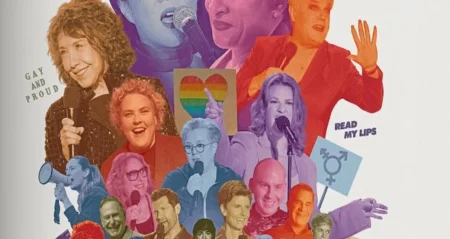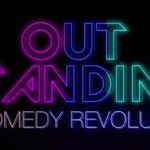The Hollywood Reporter
‘Outstanding: A Comedy Revolution’ Review: Trailblazing Queer Comics Get Their Due in Entertaining Netflix Doc
BY DAVID ROONEY
June 15, 2024

In the opening section of Outstanding: A Comedy Revolution, you might be forgiven for thinking this is an extended Pride Month promo to breathe new life into Netflix’s 2022 special, Stand Out: An LGBTQ+ Celebration. But in a Q&A following the rousingly received opening-night screening at the Provincetown Film Festival, director Page Hurwitz clarified the chicken-and-the-egg situation, explaining that she produced the event at the Greek Theatre in Los Angeles, which assembled 22 prominent queer comics on the same bill, as a foundational building block for this documentary surveying the rich history of LGBTQ+ comedians.
At a time when a new generation of queer comics from across the sexual and gender identity spectrum has emerged into what appears to be a thriving scene, this is an invaluable primer on the many performers who kicked down resistant doors to make today’s greater representation possible.
Even if it only served as a vehicle for the rediscovery of the hilarious Robin Tyler, the first lesbian comic to come out on national television in 1978, the doc would be invaluable. When Tyler and her partner Pat Harrison, who performed as the comedy duo Harrison and Tyler, took on anti-gay crusader Anita Bryant — “I don’t mind them being born again, but do they have to come back as themselves?” Tyler asks — ABC promptly canceled their deal.
Gay comedians like Charles Nelson Reilly, Paul Lynde and Rip Taylor were all over television in the 1970s, but they remained closeted; the thinking at the time was that coming out equaled certain career death.
Even a comedy titan like Laugh-In veteran Lily Tomlin, despite making no secret of her relationship with her longtime partner and now wife Jane Wagner, says that actually declaring herself a lesbian back then was unthinkable. But the fabulous Norman Seeff shot of Tomlin looking fierce in an “Evolve or Die” muscle T-shirt makes it clear that by the mid-‘80s, she was hiding nothing.
Tomlin is one of several heavy-hitters whose interviews and comedy clips provide insight into both the barriers in place and the subversive ways many comics got around them. Going back to the Black vaudeville circuit of the 1920s with performers like “Moms” Mabley, queerness has long been a factor in stand-up, whether implicit or explicit. Sandra Bernhard, Margaret Cho, Rosie O’Donnell, Wanda Sykes, Marsha Warfield, Eddie Izzard, Hannah Gadsby and Bruce Vilanch are among those weighing in with illuminating commentary.
One of the most moving aspects of the film is how it highlights the mentor-mentee dynamic of queer comedy, with each trailblazer passing on an expanded legacy to the next up-and-comer. Both Bernhard and Cho talk of Tomlin as a major inspiration, while Joel Kim Booster acknowledges that queer women in comedy were his chief influence.
Another thread that emerges is the one-step-forward-two-steps-back factor of queer representation in comedy. The advances of each decade keep hitting a wall of backlash, whether it was Bryant’s “Christian” crusading in the ‘70s or AIDS hysteria and the family values push of the Ronald Reagan years or the “Don’t Ask Don’t Tell” mentality of the ‘90s, when Bill Clinton was in office.
One of the most exhilarating clips has Bernhard appropriating the disco classic “Do You Wanna Funk?” as a rallying cry for sexual freedom, provocatively skewering the stifling conservatism of public figures like Reagan and Jerry Falwell.
Several commentators make the point that unapologetically anti-gay comedy remained widely acceptable through the end of the last century and beyond, whether it was the goofy gay-panic humor of Mel Brooks and Sid Caesar or the outright homophobia of Eddie Murphy’s stand-up specials. The flip side is Richard Pryor’s appearance at a 1977 gay rights fundraiser at the Hollywood Bowl, where he talks frankly about the joys of sex with men before turning on the well-heeled, predominantly white audience for their absence from the Black rights struggle.
Input from Scott Thompson of Canadian comedy group The Kids in the Hall is especially poignant as he talks of having to create characters to hide his sexuality behind. His acerbic bar fixture Buddy Cole was notable as “the first gay character who fucked.” Elsewhere, tacit pressure made it clear that straight audiences could get on board with queer comedy so long as they didn’t have to think about actual gay sex.
Cho was another disruptive force against that unspoken rule, with a defiantly raunchy brand of personally revealing comedy. This was precisely what queer comics were told not to do, instead being encouraged to make their material “palatable.”
The prevailing coyness around the nitty-gritty of queer sexuality in comedy is echoed also in the famous guest appearance of Ellen DeGeneres on The Rosie O’Donnell Show, where she jokingly came out as “Lebanese” and O’Donnell played along, adding that she might be Lebanese too. It’s significant that while O’Donnell’s popular daytime variety and talk show ran for six seasons in syndication and had a writers’ room filled with queer comics like Judy Gold, the host still operated under the assumption that coming out was a career killer.
Many of the interviewees discuss the experience of being unable to land a booking after their sexuality became public knowledge. One of the more emotional moments features Todd Glass recalling his successful breakthrough years as a staple of late-night comedy, never even contemplating coming out, until a heart attack and a hospital visit from his partner gave him the courage to take that step. Sykes had a different means of arriving at that point, more or less accidentally coming out by mentioning her wife during a public appearance.
Hurwitz, a former comic herself, has a great eye for choice material, clearly having dug like a truffle hound through decades of archives to find clips that often remain eye-wateringly funny today.
Inevitably there are conspicuous absences — among them Kate McKinnon, Bowen Yang, Cole Escola, John Early and Jerrod Carmichael, perhaps partly justified by the choice to focus largely on comics who participated in the Greek Theatre event — and areas where the doc could have pushed harder. Any discussion of homophobia getting a pass for way too long in comedy should include the infamous Tracy Morgan rant, when he told a Nashville audience that he would “pull out a knife and stab” his son if he were gay. Even Dave Chapelle’s inflammatory transphobic material gets only cursory coverage.
If there’s a significant flaw in the doc it’s that for a film so willing to contextualize queer comedy in the political landscape of the past, it’s surprisingly reticent about the alarming climate of the present, with a concerted push well under way to roll back many of the gains of LGBTQ+ rights. Surely somewhere on the cutting room floor someone voiced an opinion about all that’s at stake in the upcoming election?
Even so, Outstanding makes a persuasive, highly entertaining case that the evolution of queer comedy is inextricably bound to broader developments in representation, and that emerging next-gen queer comics could learn a lot from their forebears.


